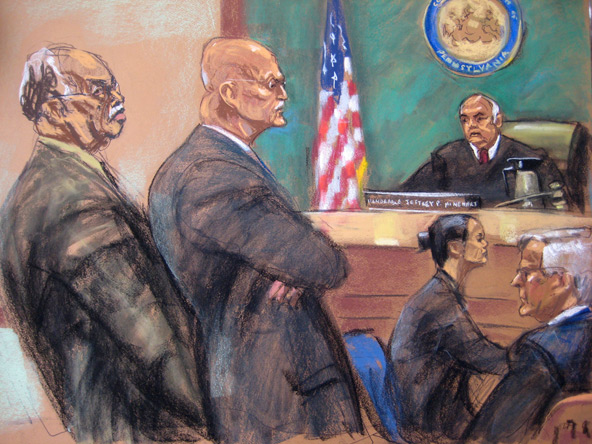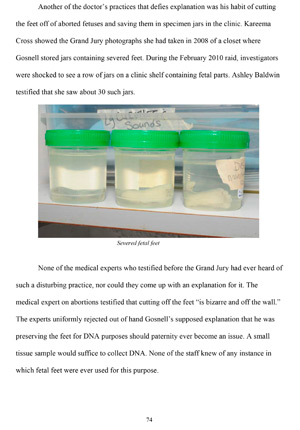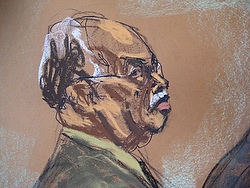
PHILADELPHIA (CNS) — Dr. Kermit Gosnell may have been convicted May 13 of murder at his Philadelphia abortion clinic, but “nothing can bring back the innocent children he killed, or make up for the vulnerable women he exploited,” said Archbishop Charles J. Chaput.


And, he added, “the repugnance of his clinic conditions” must be remembered.
In a May 14 statement, the Philadelphia archbishop said, “Gosnell is not an exception. Others just like him run abortion mills throughout our country.”
A Philadelphia jury May 13 found Gosnell guilty of murder in the deaths of three babies born alive during abortions and acquitted him of a fourth similar charge. He also was convicted of involuntary manslaughter in the death by a drug overdose of a patient who had an abortion.
Gosnell, 72, was charged with snipping the spines of babies born alive during illegal late-term abortions. Pennsylvania law prohibits abortions after 24 weeks of gestation.
“We need to stop cloaking the ugliness of abortion with misnomers like ‘proper medical coverage’ or ‘choice,'” Archbishop Chaput said in his statement. “It’s violence of the most intimate sort, and it needs to end.”
A few weeks earlier in the six-week trial, after the prosecution had rested its case, Judge Jeffrey Minehart of the Common Pleas Court, dismissed three other murder charges against Gosnell, saying they lacked evidence.
Late May 14, prosecutors said the doctor agreed to give up his right to an appeal so he would not get the death penalty. The judge then gave him two consecutive life sentences with no chance for parole on two of three first-degree murder convictions.
At a May 15 sentence hearing, Gosnell received a third life sentence for the third murder conviction and another two and a half to five years in prison for involuntary manslaughter. Those sentences also are consecutive. He also was convicted of hundreds of violations of Pennsylvania abortion regulations.
Both supporters of legal abortion and abortion opponents praised the verdict, though they pointed to different underlying problems.
Michael Geer, president of the Harrisburg-based Pennsylvania Family Institute, said in a statement, the Gosnell case in all its details points to “the big remaining question that the trial exposed for all Americans to see: How is it murder to kill a late-term baby outside the womb, but legal to kill it minutes earlier while still in its mother’s uterus?”
Ilyse Hogue, president of NARAL Pro-Choice America, said in a statement that “justice was served to Kermit Gosnell and he will pay the price for the atrocities he committed.” She described Gosnell’s clinic and practices as “a peek into the world before Roe v. Wade made legal a woman’s right to make her own choices.”
Hogue said “anti-choice politicians and their unrelenting efforts to deny women access to safe and legal abortion care, will only drive more women to back-alley butchers like Kermit Gosnell.”
Charmaine Yoest, president and CEO of Americans United for Life, said the “self-interested indifference of an unrepentant, unregulated and unmonitored abortion industry stood front and center among the tragic events that led to the conviction of Kermit Gosnell.”
Yoest’s statement said “the legacy of Gosnell’s trial will be Big Abortion’s collusion in bringing about America’s ‘red-light district of medicine’ — today’s back-alley abortion clinics and renegade abortion profiteers.”
She said “pro-life Americans must fight Big Abortion as they attempt to block commonsense attempts to regulate and monitor abortion clinics where we know that some women and girls have suffered and even died.”
Yoest said the case underscores why abortion clinics must be subject to medical standards and regular inspections. Gosnell’s clinic had not been inspected for nearly two decades, she said.
“Kermit Gosnell is not the aberration that abortion advocates claim,” Yoest added. “Over the last three years at least 15 states have initiated investigations into the conditions and practices of abortion clinics. These investigations were triggered by women’s deaths, reports of dangerous and unsanitary practices that exposed women to injuries and infections, and infants born alive following attempted abortions.”
Gosnell was arrested in 2011 and charged with seven counts of infanticide and one count of murder in the case of a woman from Virginia who died during an abortion.
Several patients and former employees testified about squalid conditions at the clinic, described by some as “a house of horrors.”
Several former workers in the clinic, including Gosnell’s wife, Pearl, a cosmetologist by training, earlier pleaded guilty to charges including third-degree murder, racketeering and performing illegal, late-term abortions.
Prosecutors said one of the babies Gosnell killed was at nearly 30 weeks of gestation and was so big that Gosnell joked it could “walk to the bus,” reported The Associated Press.
The involuntary manslaughter charge came in the death of Karnamaya Mongar, 41, a refugee from Bhutan who lived in Woodbridge, Va., and who was given repeated doses of powerful drugs to induce labor and sedate her.
The jury also found Gosnell guilty of infanticide, racketeering and more than 200 violations of Pennsylvania laws, for performing abortions past 24 weeks or failing to counsel women seeking abortions 24 hours before providing the procedure.
He still faces federal drug charges over abuse of prescriptions for OxyContin and for letting staff members make out prescriptions to patients who paid cash.
The case against Gosnell took shape after a team of health inspectors and investigators looking into drug trade raided Gosnell’s clinic, known as the Women’s Medical Society, in February 2010.
A grand jury report that followed reported on filth throughout, including blood on the floor, cat feces on the stairs and surgical rooms that resembled a “bad gas station restroom.” The investigators gathered the remains of 45 fetuses stored in bags, milk jugs, juice cartons and cat food containers.
Gosnell’s license was suspended and he was arrested in January 2011.
Archbishop Chaput said the detailed description of Gosnell’s clinic discussed at trial must remain “sharp in our memories,” and “we should remember the media’s inadequacy in covering his case.”
Lila Rose of the pro-life group Live Action said, “We must remember that Gosnell is not an outlier within the abortion industry. We cannot allow these ‘guilty’ verdicts, welcome as they are, to make us complacent when it comes to continuing abuses happening even now in abortion facilities throughout our nation.”
Edel Finnegan, director of the Pro-Life Union of Greater Philadelphia, called Gosnell “a particularly egregious abortion practitioner” but added, “I think that is the nature of the business. I hope it opens people’s eyes to the reality of abortion and the humanity of the unborn child.”
– – –
Contributing to this story were John T. Gillespie and Matthew Gambino. Gillespie writes for CatholicPhilly.com and PhaithMagazine.com, the news and magazine websites of the Philadelphia Archdiocese. Gambino is director and general manager of the websites.






